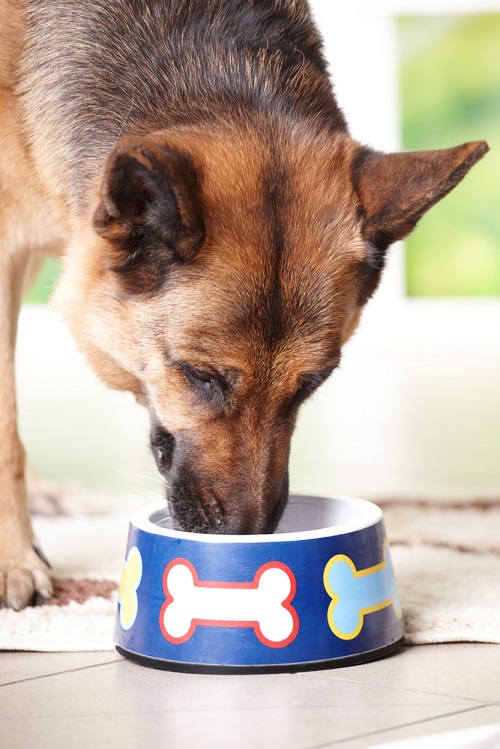Can Dogs Eat Deviled Eggs? Learn if your pup can munch on this tasty appetizer or should stay away from it!
Can Dogs Eat Deviled Eggs? From the risks of added ingredients to potential health concerns, learn why deviled eggs aren’t the best choice for your dog’s diet.
What are Deviled Eggs?

Deviled eggs are a classic appetizer that consists of hard-boiled eggs that are halved and then filled with a mixture made from the yolks, typically combined with mayonnaise, mustard, and various seasonings such as salt, pepper, and paprika.
The yolk mixture can also include a wide range of additional ingredients, such as pickles, herbs, and hot sauce, allowing for numerous flavor variations. Once the egg whites are filled with the seasoned yolk mixture, they are often garnished with a sprinkle of paprika or fresh herbs, resulting in a tasty food that is enjoyed by many.
Check put 10 High Fiber Dog Treats | Benefits and Precautions here
Can Dogs Eat Deviled Eggs?
No, dogs cannot eat deviled eggs.
The ingredients used in a typical deviled egg recipe, such as mayonnaise, mustard, or spices, can be harmful to dogs, leading to gastrointestinal upsets or even critical issues that include pancreatitis, obesity, and cancer. Additionally, some deviled eggs may contain spices like onion or garlic powder, which are toxic to dogs.
If you want to serve your furry friend a similar snack for a healthy change in their taste buds, replacing the high-sodium and fat content with dog-friendly ingredients is the only option. However, remember to give eggs to your dog in moderation and continuously monitor your pet’s reaction as you serve them this snack.
Are Deviled Eggs Bad for Dogs—Potential Health Concerns
Traditional deviled eggs recipes are bad for dogs and can lead to the following health concerns:
- High Cholesterol: Deviled eggs, which contain yolks, are high in cholesterol. Consuming large quantities of cholesterol-rich foods can contribute to an increase in LDL (bad) cholesterol levels, thereby increasing the risk of heart disease.
- High Sodium: Ingredients like mayonnaise, mustard, and salt in deviled eggs can increase the sodium content. A high-sodium diet can lead to elevated blood pressure, potentially increasing the risk of heart disease and stroke.
- High-Fat content: Dogs with digestive issues, particularly those with a history of pancreatitis, should avoid deviled eggs as they contain high levels of fat, which can lead to obesity and other health issues.
- Foodborne Illness: Improper handling, preparation, or storage of deviled eggs can increase the risk of foodborne illnesses, such as Salmonella or Listeria.
- Allergic Reactions: Some dogs may be allergic to eggs or other ingredients in deviled eggs. Consuming deviled eggs could trigger allergic reactions in these individuals, ranging from mild symptoms like itching and hives to severe, life-threatening anaphylaxis.
Check out Can Dogs Have Miso Soup | Is Miso Soup Safe for Dogs here
Dog-Friendly Deviled Egg Recipe
Although the typical deviled egg is not advised for dogs, you can prepare a dog-friendly deviled egg recipe that’s suitable for your pup’s health.
Ingredients:
- 2 boiled eggs
- 1/4 cup of cooked and mashed sweet potato
- 1/4 cup of cooked and mashed green beans
- 1 tablespoon of chopped parsley
Instructions:
- Boil the eggs until fully cooked and let them cool.
- Peel the eggs and cut them into small pieces.
- In a bowl, mix the boiled eggs, mashed sweet potato, mashed green beans, and chopped parsley.
- Scoop the mixture into small balls or shapes and place them on a baking sheet lined with parchment paper.
- Bake the egg treats at 350°F (175°C) for about 15-20 minutes or until they are firm.
- Allow the treats to cool before serving them to your dog as a nutritious and tasty snack.
The recipe can be modified to fit your dog’s specific dietary requirements and preferences. Always talk to your veterinarian before altering your dog’s food.
Are Deviled Eggs Good for Dogs—Potential Health Benefits

Deviled eggs can be good for dogs only if they are prepared with dog-safe ingredients. This dog-friendly deviled egg recipe offers several health benefits for your furry friend:
- High-Quality Protein: Eggs, an excellent source of high-quality protein, will maintain your dog’s muscle mass, support the immune system and promote healthy skin and coat.
- Vitamins and Minerals: Both eggs and sweet potatoes are rich in essential vitamins and minerals, such as vitamin A, vitamin B6, vitamin B12, and iron, which contribute to your dog’s overall health, immune system function, and energy levels.
- Dietary Fiber: Sweet potatoes and green beans are good sources of dietary fiber, which can aid in digestion, help maintain healthy bowel movements, and contribute to your dog’s overall gut health.
- Antioxidants: Green beans and sweet potatoes contain antioxidants, which can help protect your dog’s cells against oxidative stress and inflammation, promoting overall health and well-being.
- Low-Fat and Low-Sodium: This recipe omits mayonnaise and salt, making it a healthier alternative to traditional deviled eggs. A low-fat and low-sodium diet can help maintain a healthy weight and support heart health in dogs.
Check out Can Dogs Eat Egg Rolls | Are Egg Rolls Bad For Dogs here
Precautions to Follow
When feeding deviled eggs to dogs, it is essential to take the following precautions to ensure their safety and well-being:
- Portion Control: Even when using a dog-friendly recipe, be mindful of portion sizes to avoid overfeeding. Treats should make up no more than 10% of your dog’s daily caloric intake. Feeding your dog too many deviled eggs may lead to weight gain or other health problems.
- Monitor for Allergies: Dogs can be allergic to certain foods, including eggs. If you notice any signs of an allergic reaction, such as itching, swelling, or difficulty breathing, stop feeding the deviled eggs immediately and consult your veterinarian.
- Cook Eggs Thoroughly:Always make sure to fully cook eggs before feeding them to your dog, as feeding raw or undercooked eggs can expose them to the risk of Salmonella or other bacterial infections.
- Gradual Introduction: When introducing new treats to your dog’s diet, do so gradually to allow their digestive system to adjust. Start with a small amount and monitor for any signs of gastrointestinal upset or other adverse reactions.
- Consult your Veterinarian: Before introducing any new treats or foods to your dog’s diet, consult your veterinarian to make sure they are appropriate for your pet’s specific needs and dietary requirements.
Quick Takeaways
While eggs are generally healthy for dogs, it is best to avoid feeding them deviled eggs due to added ingredients that can upset their digestive systems. Raw or undercooked eggs can contain harmful bacteria, leading to food poisoning in both dogs and humans.
Rather than giving deviled eggs to your dog, you should provide them with plain, cooked eggs that do not contain any extra ingredients or spices. Feeding your dog cooked eggs in moderation as a part of a balanced diet can be a healthy and nutritious option. If you have any worries regarding your dog’s health or diet, it is better to seek advice from a veterinarian.
Check out Are Honey Buns Bad For Dogs? here
FAQs
1. What Will Happen if my Dog Eats Deviled Eggs?
If your dog eats a small amount of deviled eggs, it is unlikely to cause harm. However, deviled eggs can cause digestive issues due to the ingredients, high fat, and risk of salmonella from undercooked eggs. If your dog munches on a high amount or shows any signs of health problems, get in touch with your vet as soon as possible.
2. Can Dogs Have Mayo?
Mayonnaise is not poisonous for dogs, but it has high amounts of calories and fat, which may lead to weight gain and digestive problems. Some brands of mayonnaise may have harmful ingredients, such as garlic powder or onion.
3. Is it ok to Feed a Dog a Fried Egg?
It is safe to feed a dog a fully cooked fried egg without any added ingredients, but it is important to give it in moderation and as part of a balanced diet. Avoid seasoning the egg with spices as they can cause digestive issues or other health problems in dogs due to the high sodium and salt content.
